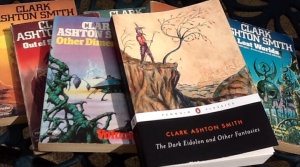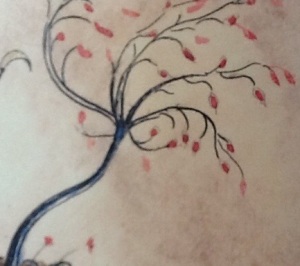The Dark Eidolon and Other Fantasies – Clark Ashton Smith
I have just received from Amazon UK the PENGUIN CLASSICS (2014) edition of selected Clark Ashton Smith works entitled The Dark Eidolon and Other Fantasies.
Edited with an Introduction and Notes by S.T. JOSHI.

My previous gestalt real-time review of The Dream-Quest of Unknown Kadath by HP Lovecraft
Please see comment stream below for any of my on-going comments about the new Penguin CAS book…
Edited with an Introduction and Notes by S.T. JOSHI.

My previous gestalt real-time review of The Dream-Quest of Unknown Kadath by HP Lovecraft
Please see comment stream below for any of my on-going comments about the new Penguin CAS book…
Related
Hashish and VentriloquismIn "a season in carcosa"
Dream Catching-UpIn "ana Kai Tangata"
Delicate ToxinsIn "Adam S. Cantwell"
Filed under Uncategorized
23 responses to “The Dark Eidolon and Other Fantasies – Clark Ashton Smith”
Clark Ashton Smith

The gradual comments in the stream attached to this post will be upon the poems published in the Penguin Classics book (2014) edited by ST Joshi and entitled ‘The Dark Eidolon and Other Fantasies’ by Clark Ashton Smith.
These represent a continuation from HERE of my comments upon the book’s stories and prose poems.
Share this:
29 responses to “Clark Ashton Smith”
- Ode to the Abyss
“In aeon-implicating wars / Thou tearest planets from their place; / Worlds granite-spined / To thy erodents yield / …”
A vocative paean to a form of abyssal infinity that seems to supplement Byron’s non-vocative Darkness… but I wonder if ‘erodents’, as well as being instruments of erosion are also gnawing rats? - A Dream of Beauty
” Blueness of sea and sky, and gold of storm / Transmuted by the sunset, and the flame / Of autumn-colored leaves,…”
A brief poem, wholly beautiful and poignant in itself. A gem, a classic. - The Star-Treader
“Enkindling dawns of memory, / Each sun had radiance to relume / A sealed, disused, and darkened room / Within the soul’s immensity.”
A swelling monologue, reaching towards a visible infinity and an infinite-by-being-invisible soul, a symbiosis that sits comfortably with his Phoenix-stoical ‘suicide-bomber’ stories. The enjambement does get in the way sometimes, but, in this poem, it seems to work within CASian terms. Amid the pre-Swinburne Byronesque, I do note the welcome taint of TS-Eliotian objective-correlative and pent-up obscurity plus a Baudelaire spirit that somehow seem to be in the retrocausal air that CAS breathes as he writes, “where chords of pain / With stridors [...] forged anew with stranger loveliness.” - Retrospect and Forecast
Following earlier retrocausalities, this poem has the astonishing concept of life being fed by death, so that it can return the favour! This is core CAS. - Nero
“And singing of the immemorial dead, / Whose dust is loosened into vaporous wings…”
Nero, Rome. Although resonant with Ozymandias by Shelley which poet I mentioned earlier, this poem becomes more of a Shakespearean soliloquy, as spoken by a diffident psychopath on the apparent brink of collaterally-damaged suicide, Nero to become Nemo as well as the poem’s start at its end, “This Rome”. - To The Daemon Sublimity
“Come thou, and bear me to thy chosen sun.”
I don’t know exactly why, but that line in this short poem brought tears to my eyes. 
Averted Malefice
I have read this poem several times without really understanding the title. Aversion as in dislike or averting as with eyes or avoiding as a form of diversion? This story of a spellful witch with Donne’s Mandrake roots, giving a new meaning to catching a falling star by this whole book’s context so far … or averting disaster – or simply creating ‘a version’ of this poem, a meaning that does not exist? Like imagining a face that isn’t really there on this book’s fleshy cover?
Aversion therapy as a sort of spell – also known as the ‘Mother of Toads’ syndrome?- The Eldritch Dark
“…the scythed moon impendent over all.”
Indeed, a poem engagingly shaping the night gradually from its twilit inception, just as the picture above has its own scythed moon!
After ‘miming the trees’, the shadows eventually become night’s gestalt… - Shadow of Nightmare
“Where darkness waits with wide, expectant lips?”
A short swart soliloquy, this too too toad-slimy flesh of night. - Satan Unrepentant
“No more remember Him than Silence does / An ancient thunder.”
More a Miltonic than a Shakespearean soliloquy, as Nero now becomes Satan speculating on his (small h) interface or symbiosis with Him (big H). A coddled rebellion, but one senses a subtle poignant stoicism that the big will always outweigh the small, even amid the Vigils of Omnipotence where one revels in vulnerability as in a childhood out-staring game… - The Ghoul
A dislocated choice of words in strict sonnet form that somehow manages to evoke the image of a ghoul. But why the variable use of both ‘phantoms’ and ‘fantoms’ in the same short poem? - Desire of Vastness
Another wordy-weird of a sonnet. Who else reads it as a paean to a large woman?
“The unstayed dominions of the brazen sky–“ - The Medusa of Despair
OcCasianly I see through the eyes of the Casian poet as he struggles with the phonetics and syllables and rhymes and the scanning of his sonnets, juggling the near-neologisms and clumsy phrases eventually made unclumsy or still clumsy…agonising … twisting, turning, tweaking the text, hour after hour, in “the unwaning light of Hell”, in near despair, until he is satisfied but, in this particular sonnet, ‘regressively’ unsatisfied, I fear. - The Refuge of Beauty
“Trembling before some nameless imminence;”
Or ‘immanence’?
This seems provokingly to deal with ‘beauty in the eye of the beholder’ both literally and metaphorically. Cf ‘Mother of Toads’ and ‘Desire of Vastness’. - The Harlot of the World
An evocative vocative addressed to Life as itself a living force that the poet ends up seeing through to the Worm that works it like the Wizard behind the screen in Oz. But is the poet or Life the harlot? - Memnon at Midnight
“…waters flowed like sleep forevermore.”
There is something wonderful about this theme and variations on Ozymandias. O able stone! - Love Malevolent
“And vipers, born and nurstled in a tomb,”
A rich Baudelairean effusion of dark love. - The Crucifixion of Eros
This should be a famous poem. It just has that feel of being a multi-anthologised poem, although this is probably a rare outing. - The Tears of Lilith
“Hemlock and hydromel and gall,”
Addressed to a lovely demon, this poem itself is another lovely demon. The words roll off the tongue as rare unction would. - Requiescat In Pace M.L.M.
“Whose fire-soft lips are not / Recalled by any sorcery of song.”
A pure Casian and Cathrian elegy of death as ‘gladder breath’, where the bracketing of exactly the same stanza at start and finish further strengthens its blissful pangs. - The Motes
A mote of a poem in a tome universe. - The Hashish-Eater; Or, The Apocalypse of Evil
“And sung by moons and motes;”
Motes and atoms of infused imagination that form a dense ritual of recurrent hypnotic endless-seeming meandering clauses of a journey in mind and place. You will never again read a poem quite like this one, nor have you ever read a poem in the past like this one. A culmination of visionary sumptuousness and succulent words and mythic clusters and dark forebodings and aeonic mind-stretching…and the final vision of self that exceeds all these things in even further degrees of what they are. (Is “wyvers” at line 551 a typo for “wyverns”?)
My first reading-aloud of this poem today: http://www.ligotti.net/local_links.php?action=play&catid=1&linkid=63&page=1 OR http://www.filefactory.com/file/3syteh18grld/VN650626.WMA
[ My other readings aloud over the years: http://nullimmortalis.wordpress.com/dfl-readings-aloud/ ] - A Psalm To The Best Beloved
A Casian love poem the last two quotable lines of which are highly memorable. - The Witch With Eyes Of Amber
A heady cocktail of love and then love turned to stone – which is a coincidence as a few minutes ago here I finished reading a story as part of a simultaneous review that complements this poem and vice versa. - We Shall Meet
“And my dreaming / Heart where fallen autumns stir”
A stoic elegy to thou with whom I poignantly share a love unrequited. - On Re-Reading Baudelaire
“Await funereal autumn and its fears”
I do, I do, forever.
To George Sterling: A Valediction
A perfect elegy to one who “Hast found the perfect love that is oblivion,…”
Anterior Life
“Fantastic love to tease my weary woe.”
That seems to be the perfect summary of the Casian literary and personal ethos.
As is, too..
Hymn to Beauty
“The ephemera flies to hail thee, candle of all our night, / And flaming dies, in adoration of its doom;”
But shouldn’t that be ‘fly’ rather than ‘flies’ because ‘ephemera’ is plural, ‘ephemeron’ being its singular?
The Remorse of the Dead
A remarkable poem of a “brothel with the dead,–“!
Exorcism
Memories of ‘you’ make phantoms harmless… You who read this, making retrocausal memories for me even while you read my words?
Nyctalops
Donne could well have written this, while in unmetaphysical, Byronic mood. - Outlanders
An oblique poem about ‘strange wars’ – resonating with today’s world by retrocausal osmosis back toward CAS still writing it?
…a hypothesis that is reinforced by,..
Song of the Necromancer
“And spectres terrible and fair
Shall walk the riven world at noon.”
To Howard Phillips Lovecraft
And even this wonderful (famous?) poem has that undercurrent of Cathrianism amid the breathless poignancy of a new KADATH and Cthulhu. Old Ones stirring in their sleep.
“For us the grief, for us the mystery…”
Madrigal of Memory
Sexual love pangs amid “covens of lost dreamers…”
Meanwhile… The Old Water Wheel endlessly turns in dreary, tired dread. A dark Koyaanisqatsi…
The Hill of Dionysus
“These things are part of all futurity; / And she and I and he, / Returning as before, / Participate in some unfinished mystery.”
And I near-wept at that, at all that is happening around us. A perfect storm, if still a calm stoical Casian one. Still eased by alcohol and forgetful fitful lazy entertainment and desperate gestalt seeking.
…further “out-ringed by the far-flung / orbit of death.” If Winter Remain and most of this poem’s lines uniquely fail to start with upper case letters. A subtle message to us today. We have lost our nobility.
Then a ‘doom-preparing’ refrain of Amithaine…
And I shall now read STJ’s material in this book, material which I am sure will give me more food for thought and information that I do not yet know. Thanks to him for this book.
Cycles
This seems to convey all I have said in this review. I at least have that to hang onto.
“The sorcerer departs…”
end








I would have thought a new edited version of CAS texts in Penguin Classics would have been free of typos at least – but on page 18 there is a typo, third line down.
“There was nothing that could break the spell of their obsession or force them to notice me;”
On one level, a page-turning, richly deadpan (if that’s not a contradiction in terms) tale of being shipwrecked on an island and meeting a mysterious busy race under mysterious skies. However, we become the narrator himself who is our own mysterious island, as he himself compares what he is to the island, on an island or this island within him, and he can touch these people and their artefacts like galley oars but the people remain oblivious of him amid their obsessive perplexity of purpose, calculating with astrolabes etc. and sacrificing to their gorilla god…who is you? What is your purpose? And it may relate to the previous stories in an oblique way of self’s mystery amid horror’s inhabitation of you, or you of it. This story will hang about forever, I guess, shedding a renewed perplexity of purpose or doubt.
He had a phobia of rivers – I guess – to avoid any such river completing the circle and making him this book’s earlier island between … where he would become a castaway upon his own accidental or half-intentional crime of passion in this Poesque tale. Geography as a face. Sunk into its own skull, to kill that life that once was his. Riparian legal rights are hardly clear cut; if you own the land whence the riverbank extends, that does not mean you own the moving beast that is the river itself…
Some of the CASian boulders where I live that I photographed over the years now about to be ‘dismantled’ – synchronously reported by myself earlier today here.
This story, in tune with the previous ones, seems to yearn to ‘immolate’ the reader particularly with a love, as I have, of all manner of tonal and atonal ‘classical’ music, and those aliens who watch me drawn as if by a magnet into its embrace take it for granted, too. They are drawn into their conventions and leave me to it, like Nemonymous Night. Drawn into the Goddess Isis? Like the world today?
A classic story that I am glad I just re-lived from my youth about to re-die in ageing. More Ligottian than Ligotti. Casian, Cathrian…
“…vague doubts and vaguer fears.”
Evils embedded by an evil book within a Christian Bishop of Averoigne is stylised here by a rich satisfyingly complex High Weird style, but depicting a relatively simple, even tongue-in-cheek, tale of finely-tuneable liquid concoctions of time travel, laced by a conspiring with the reader’s knowing humour when hinting of the sexual attraction between characters with supposedly higher purposes of good and evil. The ending was with a cute wink of predictability, too. There is a collusive CASian deadpan quality that grows from all these stories so far, as if we are in the same “smoothly flowing river”, as this latest story has it, of gently sucking funnels of time and of succulent words.
“– something too horrible and outré to be mentioned even in a myth?”
This is a set of Martian octaves to fit a symphony, nay, a synaesthesia of dust, a descant of desiccation, as time atomises upon an expedition exploring a city assumed to be more dead than death itself, yet individuals in this expedition as barely told to us by one of them, by the skin not of his teeth or even nails but of the skin of the carapace of his skull with invading sharp pixel-seething Casian caps (my words, not the story’s). It is an all-consuming succulence, betokening a welcome death beyond death itself…one can imagine modern suicide bombers feeling before they ignite themselves drilled wearing insidiously uniform cradlecaps as fontanelles. The language is equally hypnotic to induce such behaviour as disguised by succulence and seeping aeons.
Unless it is a deliberate Casian misspelling, there is another typo on page 95: ‘prestigitation’ instead of ‘prestidigitation’.
“Death became birth, and birth was death.”
This story seems to be not only about the merging by means of an ancient artefact of a modern man with someone else in an oozy “retrograde stream“, not only about the discovery of a sort of Azathoth at the core of bubbling time’s eternity or of space’s infinity or of the Nemonymous Night earth, but also and more importantly about a fantastical treatment of the astrological ‘Prenatal Epoch’ (or “antenatal” as this text terms it).
There is another typo (i.e. on page 117: “…his curious fear of failing bodily into the visionary world that he beheld” where ‘failing’ should be ‘falling’) although that typo itself arguably could take on a new meaning in itself bearing in mind my theory about this story being more about ‘as above, so below’ astrological harmonics than about the removal of free will or the imposition of predeterminism.
This prose is double rich, as if two textured shadows have slid ever closer and then overlapped with a language that a single shadow could never have mastered. Not a collaboration between two effusive authors, as they would merely have cancelled each other out with wordy overheating or arguments as to which ornate phrase fitted where. No, this is a single writer who somehow created both shadows, a writer stronger than the master magician whom he created by writing about him in order to create two such overlapping shadows. The writer did it deliberately but the master magician he created by writing about him in order to do it did it accidentally! And one can only shudder at that thought. A double shudder.
There is more to Casian fiction than its characterised prose succulence and thematic unmentionabilities of aeons – and this story again touches on the stoicism of mankind, here an imperviousness of slumbering captured damsels or voluptuous odalisques; a heroic trial of strength to thread the maze of human emotions including lust: as well as threading a tyrant’s own hybrid cruelties, the tyrant who built the maze, with some motives secret even to himself as well as sown with prehensile man-manipulating plants, and the tyrant himself has moments of breaking his own routines by granting gratuitous favours to those he’s captured…
Our own world politics today made Casian, creatively amenable, maliciously cutthroat, as we follow our own paths in each mazy life that is ours, with bodies hidden but our faces bare.
———————————
Genius Loci – Clark Ashton Smith
“…the dead willow was leaning across it at a prone despondent angle, as if mysteriously arrested in its fall toward the stagnant waters.”
If anything can follow ‘The Shadowy Street’, this better-known Classic can. It is by the sheer contrast (with that earlier story’s constructive diffuseness that needed focussing): the focus here of the locus is paramount and needs diffusing: and the narrow-channelled ‘Fall’ or ‘Autumn’ that ill-luxuriantly pervades the day (today), and the single-minded mind, for me, of the pool’s spreading influence, i.e. here diffusing the focus of the ‘ley-line’ in the morbid spirit so as to capture the strength of (what I have long called) ‘The Ominous Imagination’. But here, finally, to ‘capture’ literally, whereby the weird writer as narrator depicts his painter friend painting by that heady pool and its haunted willow focus: painting Pre-Raphaelitely, I guess, judging by the events’ outcome! Reading this story is like suffering a fever illness with visiting deliria that linger deliciously or outstay their welcome (depending how you look at it), i.e. after you have put the story down. “The human terror, which perhaps had driven him back toward his normal self,…” [Cf. the earlier John Fowles quote in this review]. (11/11/11 – two hours later)
“Anon there appeared the singers, who were she-ghouls with shaven bodies and hairy shanks, and long yellow tushes full of shredded carrion curving across their chaps from mouths that fawned hyena-wise on the company. Behind them entered the musicians, some of whom were male devils pacing erect on the hind-quarters of sable stallions and plucking with the fingers of white apes at lyres of the bone and sinew of cannibals from Naat; and others were pied satyrs puffing their goatish cheeks at hautboys made from the femurs of young witches, or bagpipes formed from the bosom-skin of Negro queens and the horn of rhinoceri.”
No amount of quoting from a Casian text will convey the relentless power of the whole text whence it has been quoted. It is unwritten madness made succulently literate. This substantial story of revenge is no exception. Any piecemeal recital of its plot will equally fail to summon up its surging sense of a minimalist music of event when coupled with that same ‘unwritten madness’ made not only succulently literate but hypnotically methodical with that page-turning sense of caliphate ‘event’, the clash of word-sword within word-flesh now become a real swordblade’s nail-biting or tooth-grinding ricochet upon our reflective mirror of self, as if Casianism has become, by hindsight, the direct but unintentional precursor of a smashing by such uploaded images through our damned TV or Computer screens, damned for carrying them as far as our eyes may yearn reciprocating such distances of cyberspace so as to watch them.
The Weaver in the Vault
“…not to be disobeyed without the incurring of penalties that would make mere death a pleasant thing.”
This tasked adventure to another dreaded city, one thus not to be disobeyed, has the pervading sense of the suicide mission that seems to fit my proffered gestalt so far for this book. Yet the end of this story, where the act of the Weaver continuing the ‘glory’ of weaving in the darkness of the now otherwise untenanted vault seems to be a heartfelt message from CAS to myself not to forget that literature should be l’art pour l’art and should not be a roman-a-clef. I agree, dear CAS. Such fiction as yours is adventurously and fantastically hedonistic for its own sake, and never to be deemed didactic, but that does not absolve any budding critic from seeking and then shaping the many preternatural messages from within any text, messages for our modern ear that you may or may not have intended to issue from your conscious mind.
Just as an aside, dear CAS, on page 202 of this latest story, we read that “The mythic terrors of Chaon Gacca began to assume a darker imminence;” – and I wonder if the ‘slow pervading’ of IMMANENCE would not be more your intention as to the word to be used rather than the sense of ‘immediate brink’ indicated by IMMINENCE, especially when taking into account the epithet ‘darker’ and the characters’ subsequent ‘fearful’, presumably stoical, passing through ‘the hushed sepulchral hall’. Having said that, though, I agree that the words ‘mythic terrors’ would arguably suggest that IMMINENCE was indeed what you intended? But can ‘imminence’ actually be dark, either dark as lacking light or dark as in pertaining to a pervading immanence of evil?
“Like a dreamer in a dream, he was wholly absorbed by the mystery on which he had stumbled; and at no time did he recall his abandoned duty.”
There is something about the name’s deanagramatisation as ‘A Three X’, the Holy Trinity? Three levels as one. On one level this is a rite of passage like that of Christ, from carpenter or, here, goatherd, a more pagan awakening, stoical path, death, each overlapping, resurrection, redemption, and the half-hearted lack of necessity for punishment in the last paragraph by a diffident ‘God’, just attrition or leprous entropy. On another level this is like the history of the world, a Toynbeean challenge-and-response…till we reach the tipping-point of endless attrition that today has brought us all?
Again, on yet another level, the prose is resplendent, a new Biblical threnody of dark cave and elegiac effulgence. Visions and dreams: pure, undidactic adventurings in alien, titanic lands… I feel that another writer to read, if you enjoy CAS on this third level, is John Gale – and my review a few years ago of his collection is here.
Another descant of desiccation, but if the earlier story had dust IN it, this one, by comparison, IS dust, as a studious recluse returns to his house whence he earlier fled, to find that the book of spells he had left on his “lecturn” had been inadvertently helped along by his aged, yet cerebral, servant reading aloud from it, summoning a fabled cursed dust-inducer. Not a death wish as it sometimes seems with students of dark tomes, not even a brush with death, but more a brush by death into some cosmic dustpan: the condition of death simply for its own sake, the ultimate Casian nihilism beyond even the strictest Cathrian or Ligottian nihilism.
“Her huge breasts, pale as frog-bellies, bulged from her torn gown as she leaned toward him.”
This book has just presented a strikingly interesting contrast between contiguous stories, this one as an inundation by slimy sex and the previous one by death dust. Make of that as you will. These two stories have uncertain degrees of experience welcome or unwelcome, spoken or inferred – art for art’s sake or didactic? These are, for me, a form of painterly arousing and deadening, uniquely abstract as well as representational. Nowhere else in literature, I sense, can there be such interplay. An atomised and flabby diptych.
The section of full-length stories in this book ends perfectly for the leitmotifs I have built up for the book’s potential gestalt. A deceptively old-fashioned inversion of a Jules Verne SF story from the middle of the earth outward to save that very earth rather than to escape from its surface for its own sake – a quest by a small band of men who, as I always felt, from the beginning of this story, were to become inevitable suicide bombers to re-ignite a ‘blind sun’ for the benefit of what they deem their residual race (here described explicitly as a mixed race), then ironically returning as the sunlight itself in a sense of hope for others if not for yourself. Sown with ‘cyclic repetition’ and ‘resignation, vignetted, as it were, on the verge of destruction‘, the dust and slime of the previous two stories are transfigured into a stoical if beautiful form of unrequited love.
Pages 261 – 266
“Perchance ’tis something to know that bodies are made of dust and water, the last of which is evaporable, and the former capable of dissolvement. For this is all our knowledge, in spite of much that is known and spoken of hierophant and philosopher. However, unlike the lore and wisdom of these, it may be contained without discommodation by one skull.”
I quoted that passage at first for its own sake, or possibly as evidence of the first few prose poems’ testing of the verities of existence, like beauty etc., with the backdrop of infinities, in a prose even more poetic (predictably) and antique than that of the short stories. However, having now quoted it, I wonder whether the word ‘by’ should have been inserted between ‘spoken of’ and ‘hierophant’? Another typo? Comments, welcome.
Stoical and Aeonic Ennui, and unrequited love, if not requited by reaching Cocaigne … or by reaching the optimum sumptuous prose itself, prose that is unmistakably Casian… tinctured Cathrian upon the shores of Lethe.
Sometimes, I think nobody can or could ever write prose like CAS: it is as if someone has dreamed up ‘greatened’ and ‘overfraught’ word-clusters and dared to ascribe or blame them to a form of depersonalised print… I dare no longer even quote them here in case I am blamed for letting them loose cyberspatially…
Nevertheless, here is a relatively mild passage, where I possibly discovered myself: already implicated as an arriviste reviewer or typo-hunter, one who is disguised as a mock-philosopher:
“He was a philosopher, from what land there was none to know or ask. Nor was there any to ask what knowledge or delight he sought in the ruined palace, with eyes always upon the moving shadows; nor what were the thoughts that moved through his mind in ghostly unison with them. His eyes were old and sad…”
“…in aeons that are too recent.”
As if CAS needs to transcend human measurement altogether, to reach beyond the ‘indesecrate horizons’ where, however, he fears to find the ‘moldy ‘or ‘mouldy’ that is himself dead …. or still alive as a spore, a remembrance of his words on paper (they have to be on paper not in an ebook so as to become that spore, I guess)… A touch-stone with words so floridly clotted they cannot possibly die.
The Lethe-rich prose poems contained in this book and reviewed above are: The Image of Bronze and the Image of Iron; The Memnons of the Night; The Demon, the Angel, and Beauty; The Corpse and the Skeleton; A Dream of Lethe; From the Crypts of Memory; Ennui; The Litany of the Seven Kisses; In Cocaigne; The Flower-Devil; The Shadows; The Passing of Aphrodite; To the Daemon; The Abomination of Desolation; The Mirror in the Hall of Ebony; The Touch-Stone; The Muse of Hyperborea.
Both Lethe and a woman named Ethel featured in CAS’s life…
My photos taken today…